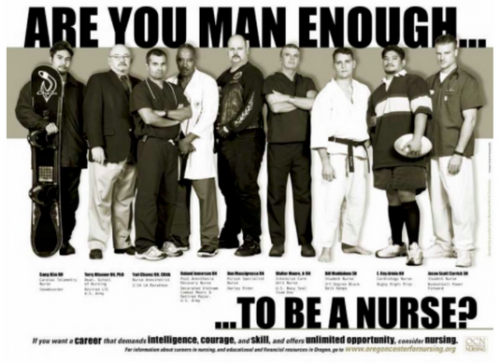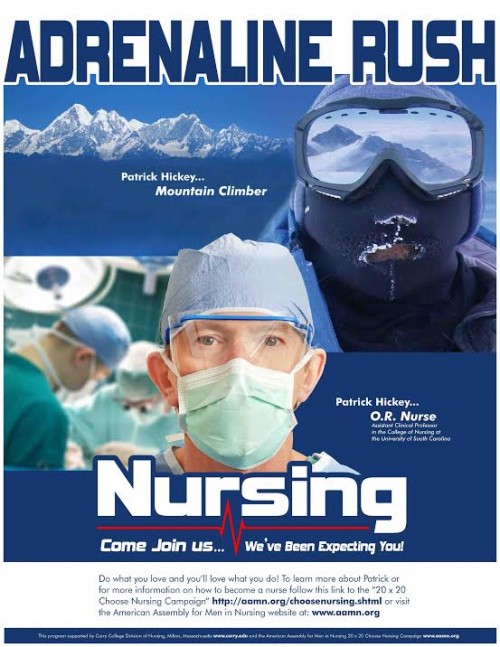While there has been significant attention to recruiting women into STEM fields, what about the converse – recruiting men to female-dominated fields? My recent article in Gender & Society analyzes the recruitment strategies of key health care players, examining themes of masculinity in text, speech, and images.
Some recruitment items, like this early poster from the Virginia Partnership for Nursing, asked viewers “Are you man enough to be a nurse?” Aspects of hegemonic masculinity — characteristics associated with being the culturally defined “ideal man” — are common themes in the poster, including sports, military service, risk-taking, and an emotionally-reserved demeanor:
Since the “Are You Man Enough?” campaign in the early 2000’s, nurse leaders have tried to make recruitment messages less ostensibly gendered. In discussing the American Assembly for Men in Nursing’s (AAMN) new campaign, Don Anderson notes:
Nursing recruitment efforts needed to evolve from asking men if they were masculine enough to be a nurse to something less gender specific
Despite the effort to “de-genderify” nursing (Anderson’s word), masculinity is still front and center. Though the slogan is different, materials continue to emphasize culturally idealized forms of masculinity. One of the AAMN’s newest posters, “Adrenaline Rush,” avoids the “man enough” rhetoric, but maintains the theme of a stoic, emotionally-detached masculinity through visual cues. Most of the nurse’s face is covered – limiting emotional expression—while risk-taking is emphasized.
But not all recruitment materials employ a macho form of masculinity. Johnson & Johnson’s 30-second clip “Name Game” portrays a caring and emotionally competent nurse:
Key health care players, including an international organization (Johnson & Johnson), urban hospital systems, nursing programs, and organizations like the American Assembly for Men in Nursing (AAMN) have devoted resources to recruiting men into nursing. Analyzing their recruitment strategies reveals as much about contemporary tensions within masculinity as it does about the profession’s push for gender diversity.
Check out more of the recruitment materials and a more in-depth analysis in the article, “Recruiting Men, Constructing Manhood: How Health Care Organizations Mobilize Masculinities as Nursing Recruitment Strategy.” For a free copy, contact me at cottingham@unc.edu.
Marci Cottingham is a postdoctoral fellow in the department of Social Medicine at the University of North Carolina – Chapel Hill. She received her Ph.D. in sociology from the University of Akron. Her research spans issues of gender, emotion, health, and healthcare. For more on her work, visit her site.
Cross-posted at Pacific Standard.



Comments 12
MMK — June 26, 2014
Honestly I'm glad to see nursing portrayed as something other than "angels who sit vigil at your bedside and CARE!" Nursing is badass. It is science. It is extremely specialized knowledge.
As a cisgendered female, I am not "man enough" to be a nurse. But I am certainly not "angelic." I wonder if the damaging stereotypes of nurses will fade away as more men enter the field. Of course, that says a lot about which gender is valued in our society.
What a complex issue.
Bill R — June 26, 2014
Two thoughts:
1. The word "Nurse" probably has feminine connotations and leaves a lot of guys thinking of a different profession. Change the name; it's done in business ALL THE TIME to make jobs more attractive.
2. Change procedures that essentially make nurses subservient to doctors. Medical doctors are wildly overrated in the US, thanks in part to the AMA. They're essentially front-line technicians who follow standard protocols like many other professionals. Blur the lines between doctors and nurses even more than they are now.
Bagelsan — July 2, 2014
Interesting, several male nursing students I know have been told that "a male nurse's place is in the OR!" Apparently that's the manliest type of nurse, because even in nursing we need gender hierarchies. :p
Cecee — July 3, 2014
I'm in healthcare and there are definitely some more "manly" departments where male nurses mostly work. Males tend to concentrate on emergency (ER), anesthesiology, or administration nursing. There has been some nursing editorials and literature on how males may sometimes be fast tracked in their specific careers because they are male. An example is a male nurse who also wants to be in administration, he may be promoted because admin is seen as a male role. There are still more women, but I welcome males to nurses. Intelligence and caring needed in the health field is not gender specific.
Sarita Rautla — April 11, 2025
👨⚕️Challenging stereotypes and redefining masculinity in nursing—this article offers a compelling look at recruitment strategies. 👏
Roberto Palmer — September 17, 2025
The biggest attraction of space waves lies in the simple yet addictive gameplay. You just need to hold the key to fly up, release to land - but each operation requires absolute precision.
Mitchell Walsh — September 29, 2025
Each level is like a stepping stone that Geometry Dash Full Version helps you build your confidence while also testing your reflexes, timing, and ability to think strategically
luxin — October 11, 2025
Thank you so much for taking the time to read and share your thoughts! Your feedback means a lot
Khanapara Teer Result
Khanapara Teer Result Today
Rthed Okile — December 26, 2025
Having multiple tools scattered across the web wastes valuable time and effort.
The SixGamez Tool Website brings all useful online tools together under one reliable platform.
ds4windows — December 30, 2025
Use the DS4Windows input configuration guide to refine sensitivity and response.
Optimize controller behavior for different games and styles.
Gavind Sadier — January 1, 2026
A good font library saves time and improves creative workflow, and Font Chase does exactly that. It supports designers with diverse typography options.